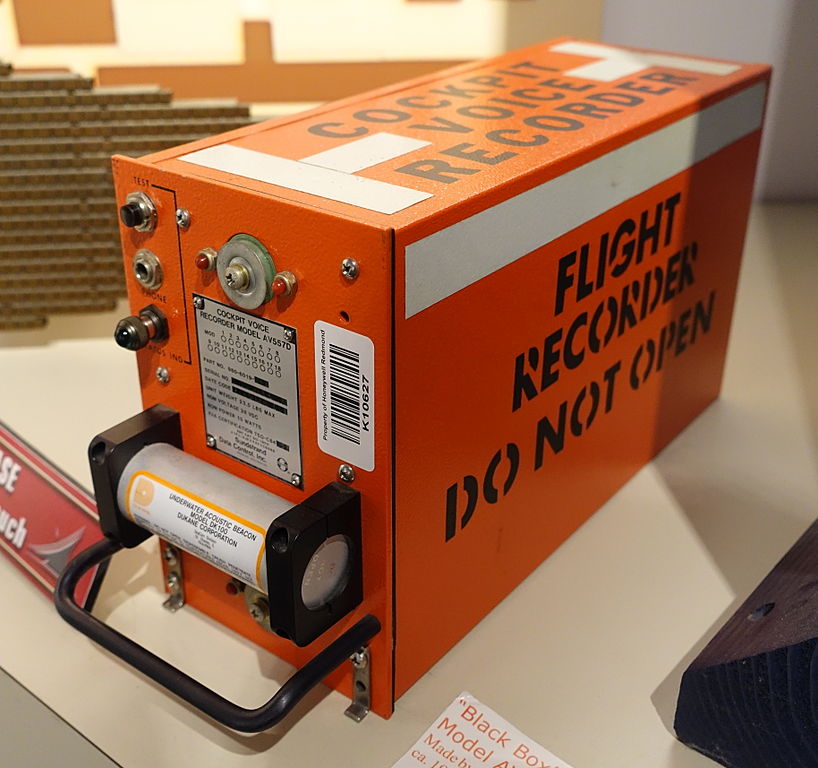“Black Box Thinking” by Matthew Syed (book review)

A colleague recommended I read “Black Box Thinking” by Matthew Syed. Not quite knowing what to expect, I did. And what a powerful message. A message about the value of learning from mistakes, and the critical importance of maintaining an organisational culture that welcomes the opportunity to learn from failure rather than punishing it.
The title comes from the key example of the benefits of this approach. As you can see above, black boxes in aircraft are actually orange but no matter. Air travel was once very dangerous, and aircraft often crashed. By investigating these accidents in an open and thorough way, much was learned and shared. People learned from others’ mistakes and safety improved. This was only possible because of the openness in these investigations. If there had been a culture of culpability and punishment, important information would have been covered up and lessons would not have been learned. I hadn’t made the connection before, but this must be why the Air Accident Investigation Bureau were so reluctant to blame the pilot of the Hawker Hunter that crashed at the Shoreham Air Show in 2015 despite pressure from the police for a prosecution.
Contrast that with the culture in many health services worldwide. Syed claims that in the USA, more people die from mistakes made in hospitals than in road traffic accidents. Despite some improvement, there is still a culture of protection, secrecy and cover-up in the event of a mishap. The contrast is stark. As a result, air travel is now the safest form of transport, yet many lives are still lost in hospitals because of avoidable, repeated errors.
Syed makes five key points:
- Failing to learn from mistakes is a huge obstacle to progress.
- We need a culture that encourages learning from failure rather than blame.
- Mistakes are part of progress, we must treat them as a key part of development.
- Deep-seated beliefs hamper progress. When confronted with evidence refuting these beliefs, we are more likely to re-frame the evidence or make excuses than change beliefs.
- Big problems can be solved by breaking them down into smaller parts and solving them by finding out what works and what doesn’t. Things we try that don’t work are not mistakes.
So, what is “Black Box Thinking”? According to Syed, “It is about the willingness and tenacity to investigate the lessons that often exist when we fail, but which we rarely exploit.” He goes on to say, “It is about creating systems and cultures that enable organizations to learn from errors, rather than being threatened by them.”
The culture of blame is deep-rooted in our psychology. We subconsciously seek to improve our social position in a group by pointing out the shortcomings of others. Even if we are too polite or socially aware to say such things, few of us would admit we never think them.
“Society, as a whole, has a deeply contradictory attitude to failure. Even as we find excuses for our own failings, we are quick to blame others who mess up.”
Syed advocates an open loop approach to failure. A closed loop is where failure doesn’t lead to progress because information on errors and weaknesses is misinterpreted or ignored; an open loop does lead to progress because the review and lessons learned is rationally acted upon.
Practicing before an event is about learning from failure before committing to the real thing, where failure would be much more costly. It is better to fail in practice in preparation for the big event than in the event itself. This is normal in the arts and sport. This is also the case in organisations that carry out pilot schemes or test ideas in simulators in order to learn, before rolling out new ideas or procedures. The more we allow ourselves to fail in practice the more we will learn, leading to success when it really matters.
Investigation and learning should not be restricted to failures. Much can be learned from expected or positive outcomes too. “When people don’t interrogate errors, they sometimes don’t even know they have made one (even if they suspect they may have).”
Black Box Thinking can be applied to any industry, any function and any role. In Sales, we often have a “Win-Loss” review after major sales contracts have been won or lost. In reality, these often don’t provide the lessons they could, partly due to egos and partly due to organisational culture. After a big win, the review is usually congratulatory, and misses the chance to look at what could have been done even better, or what could nearly have gone wrong. After lost contracts there is often a desire to draw a discreet curtain over the past and swiftly move on, or blame other parties (preferably external) to deflect any criticism. More lost opportunities for learning which could have improved future sales success.
There are many good quotes in this book, but I will finish with this:
“If we wish to fulfil our potential as individuals and organizations, we must redefine failure…..Only by redefining failure will we unleash progress, creativity, and resilience.”
“Black Box Thinking” by Matthew Syed is available on Amazon in book format or Kindle
Neville Merritt
